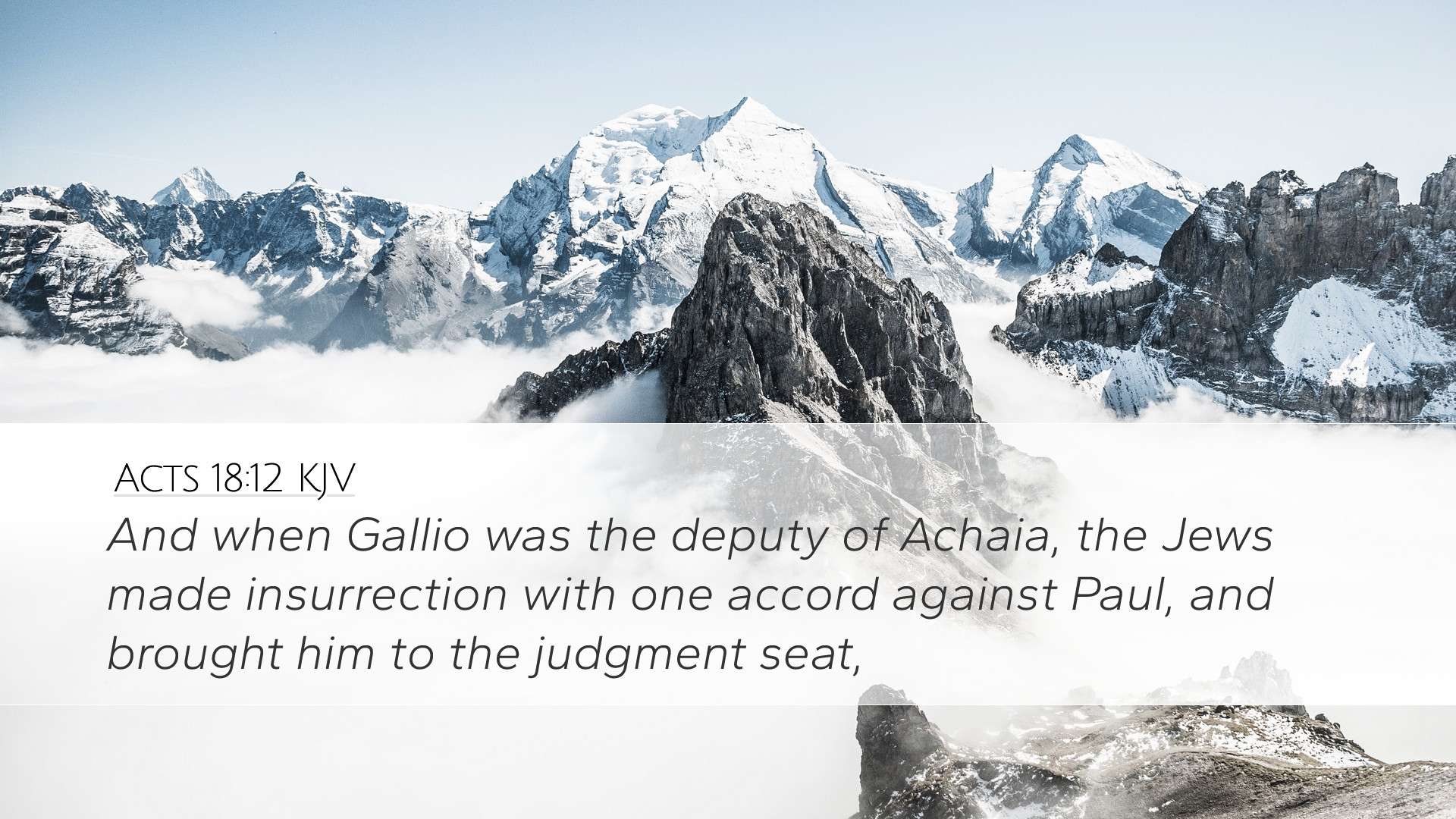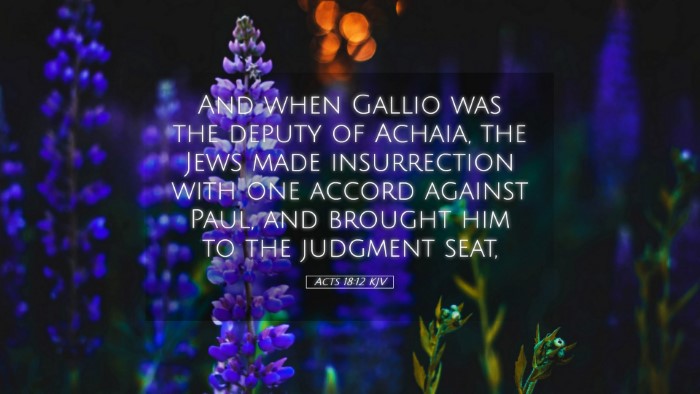Commentary on Acts 18:12
Acts 18:12 states:
"But when Gallio was proconsul of Achaia, the Jews made a united attack on Paul and brought him before the tribunal."
Introduction
This verse serves as a critical turning point in the ministry of the Apostle Paul, illustrating the tensions between early Christians and Jewish authorities, as well as the governmental structures of the time. The context surrounding this verse reveals much about the sociopolitical climate in which Paul was operating. The insights provided by public domain commentaries such as those of Matthew Henry, Albert Barnes, and Adam Clarke help to unpack the rich layers of meaning contained within this scripture.
Context and Background
To fully grasp the implications of Acts 18:12, it is essential to understand the historical backdrop. Paul had established himself in Corinth, teaching both Jews and Gentiles about Jesus Christ. The proconsul Gallio sets the stage for this narrative, a figure known from historical records to be tolerant and fair-minded. This situation complicates the Jewish leaders' efforts to undermine Paul, as they seek to use civil authority against him.
Insights from Matthew Henry
Matthew Henry provides a detailed perspective on this verse, noting the cohesive actions of the Jewish authorities. He comments on their “united attack” against Paul, indicating a significant coordinated effort to silence his preaching. Henry emphasizes that the Jews were not only attempting to malign Paul but also sought to delegitimize his message, which threatened their own religious authority. He depicts Gallio as a rational leader who was wise enough to see through their machinations:
- Character of Gallio: Henry describes Gallio as an indifferent proconsul who would not involve himself in religious disputes, which created an opportunity for the early Church.
- Jewish Unity: The united front of the Jews is seen as a sign of desperation, showcasing their loss of influence over their audience in Corinth.
Insights from Albert Barnes
Albert Barnes also addresses the significance of Gallio being proconsul at this time. He notes:
- Political Significance: The mention of Gallio being proconsul provides a historical anchor, enhancing the credibility of Paul's narrative. The fact that this event is placed accurately within the timeline of Roman governance adds weight to the historical authenticity of Luke’s account.
- Legal Precedent: Barnes highlights Gallio's refusal to adjudicate religious disputes, which paved the way for the spread of Christianity. His assessment shows that the early Church could not be easily silenced through secular means.
Moreover, Barnes points out that this event illustrates patterns of opposition that Paul faced, contributing to the larger narrative of early Christian persecution.
Insights from Adam Clarke
Adam Clarke provides a deeper theological lens through which to understand the implications of Acts 18:12. He observes:
- The Role of Providence: Clarke accentuates the idea of divine providence at work, suggesting that God used Gallio's indifference to protect Paul and the fledgling Church from persecution.
- Spiritual Warfare: He interprets the united attack of the Jews as indicative of spiritual warfare, where the forces of evil sought to impede the progress of God's kingdom through the opposition of His messenger.
In Clarke's view, this moment in Acts illustrates the larger themes of resistance and resilience that define the early Christian movement.
Theological Reflections
In light of the commentary generated by these scholars, several theological reflections arise from Acts 18:12:
- The Nature of Opposition: The verse and its surrounding context remind believers that they may face united opposition from those who perceive the Gospel as a threat to their authority or belief systems.
- God’s Sovereignty: The way God intervenes through civil authorities, as seen in Gallio's response, reassures the faithful that God’s plans prevail, despite human opposition.
- Unity in Opposition: The coordinated efforts of the Jewish leaders amplify the idea that unity, even in opposition to righteousness, can be a powerful force, challenging believers to remain steadfast and united in their Gospel mission.
Conclusion
Acts 18:12 serves as not just a historical account but a profound narrative element that reflects the tensions faced by early Christians. With insights drawn from Matthew Henry, Albert Barnes, and Adam Clarke, contemporary readers are reminded of the challenges and triumphs of faith. This verse invites pastors, students, theologians, and scholars to consider the interplay of divine sovereignty, human opposition, and the enduring mission of the Church. As we reflect on this passage, may we remain vigilant and courageous in our witness, inspired by the resilience of Paul and the early Church.


